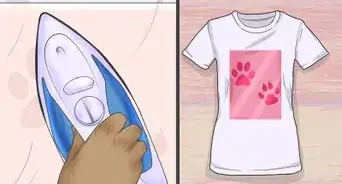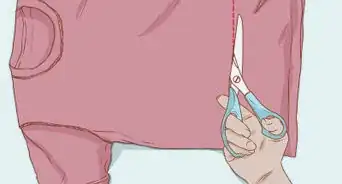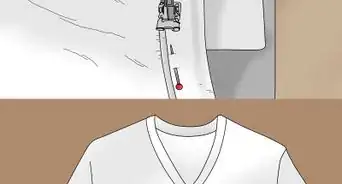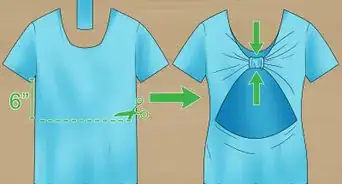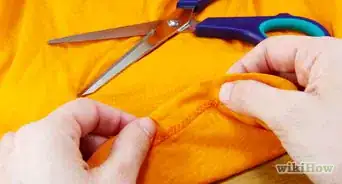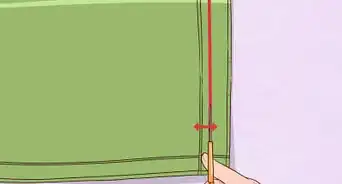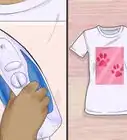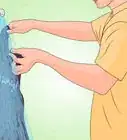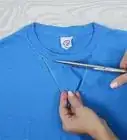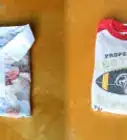wikiHow is a “wiki,” similar to Wikipedia, which means that many of our articles are co-written by multiple authors. To create this article, 25 people, some anonymous, worked to edit and improve it over time.
The wikiHow Video Team also followed the article's instructions and verified that they work.
This article has been viewed 509,904 times.
Learn more...
When summer comes, there’s nothing quite as comfortable as a sleeveless T-shirt. Of course, you can run to the store and plunk down a pocketful of cash, but why pay money for a sleeveless T-shirt when you can make your regular T-shirt sleeveless just a few minutes? Here is how to do it.
Steps
-
1Test the look. Roll up the sleeves as high as you can, or tuck them into the shirt around the seam to see if it looks good as a sleeveless T-shirt.
-
2Decide how you’re going to cut it. There are two ways to go: leave the seam between the sleeve and the shirt in place, or cut it out.
- Leaving the seam intact will keep your finished T-shirt from unravelling and looking shabby. It will also make a smaller armhole. For a baggy T-shirt, this is a good approach.
- Cutting out the seam with the sleeve is a more casual look, and because the hole is larger, a little more comfortable as well.
- If the armhole is going to be too deep, modify your cut. Instead of following the seam all the way around the sleeve, when you are about 2/3s down the sleeve, angle out into the bottom of the sleeve. When you reach the bottom seam of the sleeve, reverse the angle and cut back in towards the shirt seam, leaving a triangle of shirtsleeve at the bottom of the hole. Trim that to fit.
Advertisement -
3Lay the T-shirt out on a clean, flat surface. If you’re cutting out the seam with the sleeve, mark where you are going to cut with chalk. If you’re going to keep the seam, poke your scissors into the sleeve about 1/8 inch (3mm) from the seam.
-
4Carefully cut around the sleeve. If you’re keeping the seam, keep the cut close to it, about 1/8 inch (3mm) all the way around. Be careful not to cut too close to the seam, or it may unravel after a couple washings.
- If you are cutting out the seam, follow your chalk lines, and cut as smoothly as you can to avoid a jagged look.
- Repeat on the other sleeve.
- Keep the sleeves for future projects.
-
5When you’re done, you can hem the edges if you’d like, or simply leave them cut. They will curl and soften with use, and help you keep your cool all summer long!
-
6Finished.
Community Q&A
-
QuestionHow do I cut off the sleeves on a v-neck shirt?
 T. ChinsenTop AnswererFollw the instructions in the article. A sleeveless top with a comfortable armhole fit can be used as a template. Pin to the garment to be adjusted and use dressmaker's chalk to mark the armhole outline.
T. ChinsenTop AnswererFollw the instructions in the article. A sleeveless top with a comfortable armhole fit can be used as a template. Pin to the garment to be adjusted and use dressmaker's chalk to mark the armhole outline. -
QuestionHow do I cut a larger arm hole without creating a gap in the fabric of the hole where the breast is?
 PhoebeAmelia24Community AnswerCut downwards and not forwards. If you cut forwards, it will leave a gap and expose the breast area.
PhoebeAmelia24Community AnswerCut downwards and not forwards. If you cut forwards, it will leave a gap and expose the breast area.
Warnings
- Cutting the seam off of the shirt causes armholes to be larger and also leaves the armholes more likely to rip.⧼thumbs_response⧽
Things You'll Need
- Scissors.
- T-shirt.
- Tailor’s chalk.
- Sewing kit or sewing machine.
About This Article
To make a sleeveless t-shirt from an unused t-shirt, start by laying the shirt out on a flat surface. Then, use scissors to cut along the seam between each sleeve and the rest of the shirt. If you're going for a casual look, cut the seams off with the sleeves. Alternatively, if you want a neater finish, leave the seams intact when you cut the sleeves off. Finally, once the sleeves are off, try on the shirt to make sure the armholes are even. For ideas on how to reuse your t-shirt sleeves after you cut them off, scroll down!

